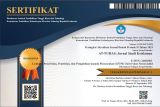Chinese Muslim Nationalism: Measuring the Love of Land for the Chinese Ethnic Community in Jember
(1) * Rosyadi Br
 (UIN KH Achmad Siddiq)
(UIN KH Achmad Siddiq) Indonesia
(2) Hartono Hartono (UIN KH Achmad Siddiq)
Indonesia
(3) Ahmad Winarno (UIN KH Achmad Siddiq)
Indonesia
(*) Corresponding Author
AbstractIn Indonesia, nationalist consciousness has recently been facing many problems, threats, and concerns about daily life security. The threat has shifted from armed threats to threats of poverty, ignorance, backwardness, hunger, diseases for which no cure has been found, scarcity of employment opportunities, unemployment everywhere, arbitrary actions of those in power, crime, SARA, national disintegration, anti-nationalist terrorism, narcotics trafficking. Illegal drugs are troubling the future of the younger generation. One of those who got the effect was ethnic Chinese residents. This research was conducted with the ethnic Chinese locus in the Indonesian Chinese Islamic Association of Jember, focusing on how the Jember ethnic Chinese Muslim community views nationalism. What is the process of instilling nationalist values among the ethnic Chinese Muslim community of Jember? This research aims to trace the nationalism of the ethnic Chinese Muslim community in Jember towards Indonesia and the process of instilling nationalist values among them so far. This research uses a qualitative paradigm with a narrative research approach. The results of this research show that the nationalist values of Jember's ethnic Chinese Muslim community have been ingrained since birth because the Jember Chinese Muslim community was born in Indonesia, not in China. Ethnic Chinese who were born in Indonesia to Chinese citizens in China are called overseas, which is why they are considered not to be genuine Chinese citizens because they were not born and distributed in the land of their ancestors. Nationalism is not just a saying; nationalism is a necessity that Jember's ethnic Chinese Muslims firmly hold. His nationalist experience was formed by practising the values of Pancasila. Forms of instilling and strengthening nationalism among member ethnic Chinese Muslims by holding regular discussions, mutual respect, tolerance, participating in state activities, cooperation and defending the country.
|
Keywords
Nationalism; Indonesian Chinese Islamic Association; Jember.
Full Text: PDF
Refbacks
- There are currently no refbacks.
Copyright (c) 2023 Rosyadi Br
This journal is licensed under a
Creative Commons Attribution-ShareAlike 4.0 International License





.png)






